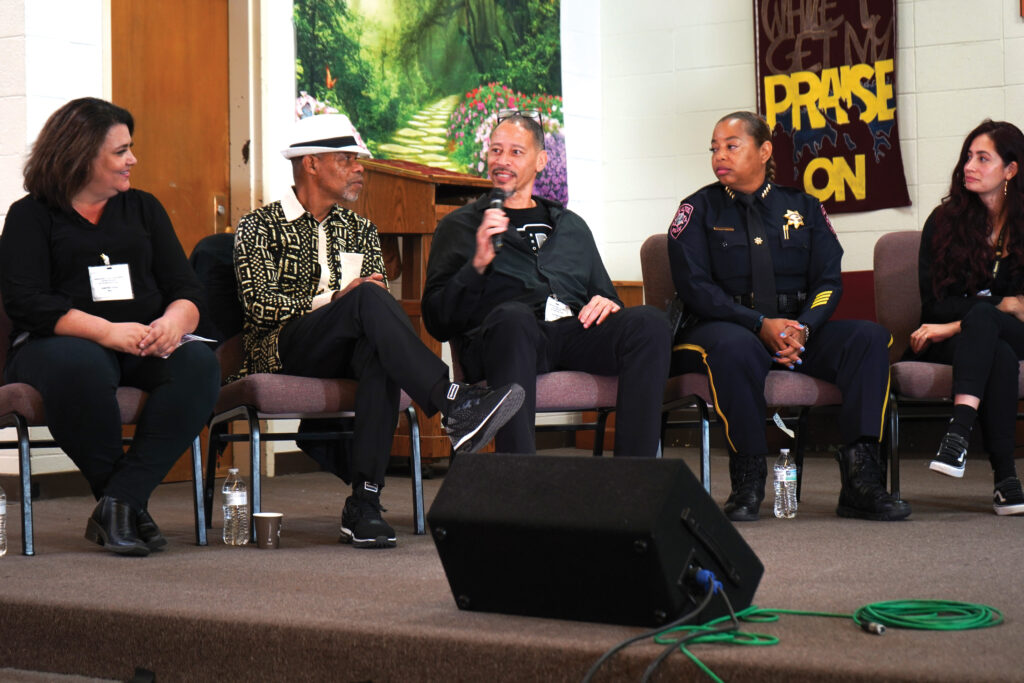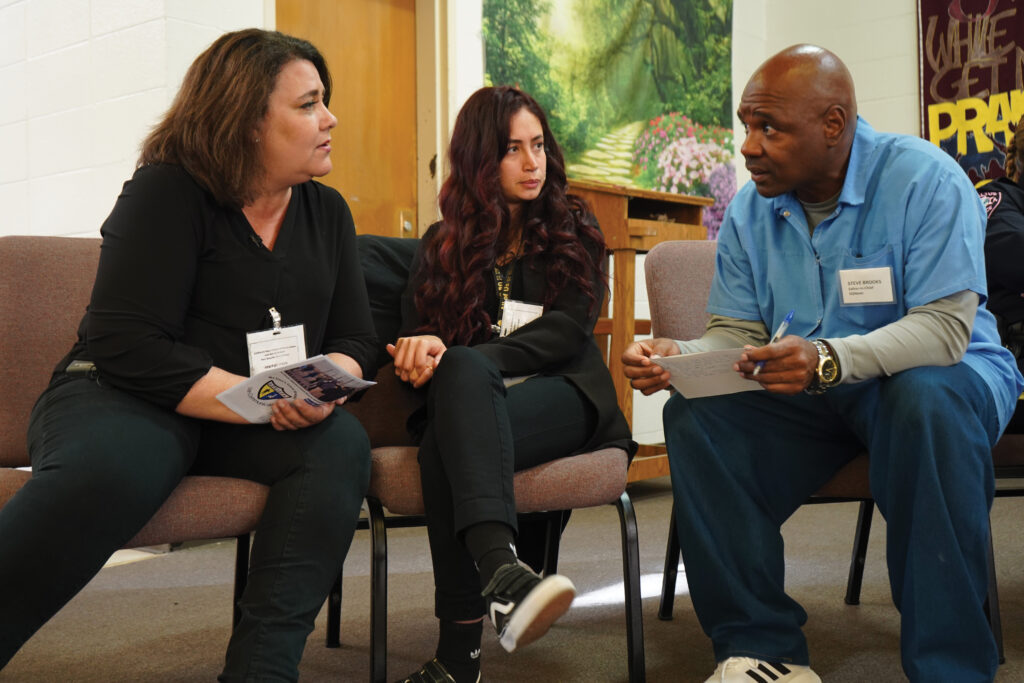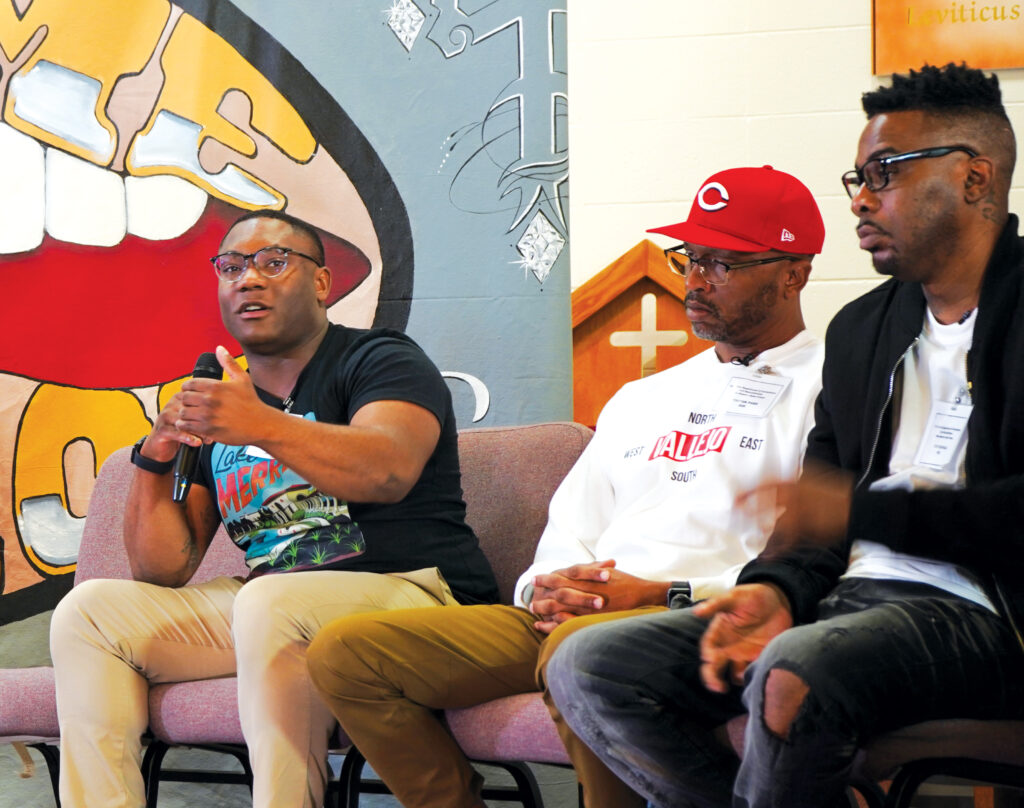Change discussed in barbershop-style symposium

Politicians, entertainers, and social-justice advocates convened at San Quentin’s first ever Game 4 Peace event in mid-October, to discuss solutions to cycles of crime and violence.
Resident facilitators helped the distinguished panel of community leaders explore some of the critical issues that plague communities. Members of the audience participated in the discussion.
The concept for the event was brought forth by Walter Burns, a former gang affiliate and a member of 2 Pac’s Thug Life rap group, who said the event was five years in the making.
“That’s five years of waiting to have honest conversations about how to address the social ills found in our dysfunctional communities,” Burns said of the challenges of organizing the event and getting panelists onboard.
He also talked about the need for self-help and rehabilitative programs to help people before they come to prison instead of only after.
“There are no platforms in our communities discussing causative factors and cognitive disorders,” Burns said. “We shouldn’t have to come here [to prison] to learn this.”
One of the topics covered was childhood trauma and its roots in community violence and crime.

SQ resident Steve Brooks–who is also the Editor in Chief of this newspaper–reflected on how the wide range of abuses he suffered as a child carried over destructively into his adulthood, and how he eventually found healing.
“I know that most people have some type of experience from their childhood that they carry with them in life. It’s the most difficult time because we’re so new to the world,” Brooks said.
He mentioned that his solution to healing was opening up regardless of the shame, and using the pain in a positive way.
“It took emotional intelligence to forgive the people that hurt me. It ain’t gonna go away; you got to find a way to flip it and use it for empowerment,” Brooks added.
Panelist Jeanne Andrade, a community activist from Los Angeles, spoke to the importance of having engaged parents present to help curb or prevent harm caused by a child feeling neglected, unsupported, or abandoned.
“When you lose your mother, people rally around you for support. But when your mother or father goes to prison, no one really comes around, you don’t get that type of support,” Andrade said. “One way to get out of the cycle of generational curses is having a present father and a present mother.”
SQ resident Steven “Rashyd” Zinnamon spoke about the dangers of emotional neglect and the importance of a child’s value being affirmed through care and attention.
“What I’ve learned in working with juvenile diversion programs, is that [young people] don’t care how much you know until they know how much you care. Some of those little brothers were never told, ‘Hey man, you’re doing good,’ and that hurt me to my soul,” he said.
Panelist Angela Everett chief of the Los Altos Police Department, emphasized the importance of police relations with the community as a positive means of youth mentorship. Someone in the audience asked her, “Why?”
“Why not?” she responded. “Just because I wear this uniform does not mean I’m not part of the community. I’m someone’s mother, auntie, sister, wife. I don’t sleep in this uniform — this is my job.”
Another one of the panelists was the mayor of Hercules, Alex Walker-Griffin, who mentioned the importance of providing wrap-around services, such as after school programs, as a safety net for youth. He sees such services as providing places where children can get the love and support they need to address issues early, so that it will not become a bigger problem later.
“With two alcoholic parents, the one thing I never heard growing up was ‘I love you,’ and for years I didn’t know how much that impacted me,” Walker- Griffin said.

Hakim Brown, a Vallejo city council member, implored members of the community to be more actively involved in town hall meetings and other civic functions. He said that politicians are in “the habit of playing the blame game, of passing the buck on decisions in creating youth centers.”
He called for people to start holding them accountable by showing up.
“They’re hoping you and your family never show up to a city council meeting. They will let you protest, but they hope that you don’t show up,” Brown added.
Panelists also discussed differentiating criminal intent from the manifestations of mental illness. Among them was Burns, who spoke about the importance of sending people to state hospitals who needed such help, as opposed to prisons.
“I see people in here that belong in a hospital because the medication they on got ’em walking like zombies, defecating on themselves. They’re just given medication and not getting the help they need,” he said.
Bay Area rapper Mack Mall weighed in on the importance of police using better discernment in engaging people on the street who are acting erratic.
“Somebody could be high or crazy, so for an officer to take their time, have that compassion, to take that second to think before we do,” Mall said.
Chief Everett helped to shed light on this issue by discussing police training, compassion, and the importance of the mental health of officers, too.
“There’s a lot of [mentally] ill police officers on the street right now,” she said. “We were taught to suppress our emotions in regards to the horrible things we see every single day and that is trauma that builds up over time. That affects the way you deal with people while you’re out in public.”
One audience member, a resident named Joe, spoke about the value of communal accountability in regards to addressing crime, violence, and keeping communities safe.
“We never want to talk about how we destroying our own community,” he said. “We always want to point the finger at someone else. We need to clean up our own neighborhoods.”
On a final note, resident Anand Alexander asked what the advocates need from the incarcerated to make their efforts more impactful.
“We need to change how we think about life and who we are,” said Lonnie Morris, a formerly incarcerated resident of SQ and the founder of No More Tears, a program that teaches those in prison about victim awareness and healing from trauma.
“Put yourself in a position to be able to go back out there in the world and be a representative of people that’s incarcerated. It could be 10 people that get out and do something positive, but if one gets out and does something sideways, they’re always going to talk about that,” Morris said.
Brown also answered Alexander’s question.
“The more that you continue to do that great, amazing work — of starting [groups], taking self-help groups, being a part of these groups — the easier it is for me to advocate for you.”